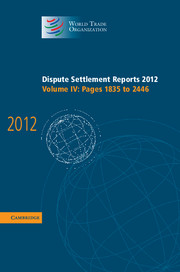Book contents
- Frontmatter
- Table of Contents
- United States - Measures Concerning the Importation, Marketing and Sale of Tuna and Tuna Products (WT/DS381)
- Table of Contents
- CASES CITED IN THIS REPORT
- ABBREVIATIONS USED IN THIS REPORT
- I INTRODUCTION
- II ARGUMENTS OF THE PARTICIPANTS AND THE THIRD PARTICIPANTS
- III ISSUES RAISED ON APPEAL
- IV BACKGROUND AND OVERVIEW OF THE MEASURE AT ISSUE
- V LEGAL CHARACTERIZATION OF THE MEASURE AT ISSUE
- VI ARTICLE 2.1 OF THE TBT AGREEMENT
- VII ARTICLE 2.2 OF THE TBT AGREEMENT
- VIII ARTICLE 2.4 OF THE TBT AGREEMENT
- IX MEXICO'S CLAIMS UNDER ARTICLES I:1 AND III:4 OF THE GATT 1994
- X FINDINGS AND CONCLUSIONS
- ANNEX I Notification of an Appeal by the United States, WT/DS381/10
- ANNEX II Notification of an Other Appeal by Mexico, WT/DS381/11
- Table of Contents
- TABLE OF WTO DISPUTES CITED IN THIS REPORT
- TABLE OF GATT DISPUTES CITED IN THIS REPORT
- LIST OF ABBREVIATIONS
- LIST OF US EXHIBITS CITED IN THIS REPORT
- LIST OF MEXICAN EXHIBITS CITED IN THIS REPORT
- LIST OF AMICUS CURIAE EXHIBITS CITED IN THIS REPORT
- I INTRODUCTION
- II FACTUAL ASPECTS
- III PARTIES' REQUESTS FOR FINDINGS AND RECOMMENDATIONS
- IV ARGUMENTS OF THE PARTIES
- V ARGUMENTS OF THE THIRD PARTIES
- VI INTERIM REVIEW
- VII FINDINGS
- VIII RULINGS AND RECOMMENDATIONS
- Cumulative List of Published Disputes
VIII - ARTICLE 2.4 OF THE TBT AGREEMENT
Published online by Cambridge University Press: 13 December 2017
- Frontmatter
- Table of Contents
- United States - Measures Concerning the Importation, Marketing and Sale of Tuna and Tuna Products (WT/DS381)
- Table of Contents
- CASES CITED IN THIS REPORT
- ABBREVIATIONS USED IN THIS REPORT
- I INTRODUCTION
- II ARGUMENTS OF THE PARTICIPANTS AND THE THIRD PARTICIPANTS
- III ISSUES RAISED ON APPEAL
- IV BACKGROUND AND OVERVIEW OF THE MEASURE AT ISSUE
- V LEGAL CHARACTERIZATION OF THE MEASURE AT ISSUE
- VI ARTICLE 2.1 OF THE TBT AGREEMENT
- VII ARTICLE 2.2 OF THE TBT AGREEMENT
- VIII ARTICLE 2.4 OF THE TBT AGREEMENT
- IX MEXICO'S CLAIMS UNDER ARTICLES I:1 AND III:4 OF THE GATT 1994
- X FINDINGS AND CONCLUSIONS
- ANNEX I Notification of an Appeal by the United States, WT/DS381/10
- ANNEX II Notification of an Other Appeal by Mexico, WT/DS381/11
- Table of Contents
- TABLE OF WTO DISPUTES CITED IN THIS REPORT
- TABLE OF GATT DISPUTES CITED IN THIS REPORT
- LIST OF ABBREVIATIONS
- LIST OF US EXHIBITS CITED IN THIS REPORT
- LIST OF MEXICAN EXHIBITS CITED IN THIS REPORT
- LIST OF AMICUS CURIAE EXHIBITS CITED IN THIS REPORT
- I INTRODUCTION
- II FACTUAL ASPECTS
- III PARTIES' REQUESTS FOR FINDINGS AND RECOMMENDATIONS
- IV ARGUMENTS OF THE PARTIES
- V ARGUMENTS OF THE THIRD PARTIES
- VI INTERIM REVIEW
- VII FINDINGS
- VIII RULINGS AND RECOMMENDATIONS
- Cumulative List of Published Disputes
Summary
Introduction
343. The United States and Mexico each appeal different elements of the Panel's findings under Article 2.4 of the TBT Agreement. The United States appeals the Panel's finding that the “AIDCP dolphin-safe definition and certification” constitute a “relevant international standard” within the meaning of Article 2.4 of the TBT Agreement. In particular, the United States appeals the Panel's intermediate finding that the AIDCP constitutes an “international standardizing organization” for the purposes of Article 2.4 of the TBT Agreement. Mexico appeals the Panel's conclusion that Mexico failed to demonstrate that the AIDCP standard is an effective and appropriate means to fulfil the objectives pursued by the United States.
344. The Panel interpreted the term “international standard” in Article 2.4 of the TBT Agreement to mean a “standard that is adopted by an international standardizing/standards organization and made available to the public”. The Panel in turn interpreted the term “international standardizing organization” to refer to “a legal or administrative entity based on the membership of other bodies or individuals that has an established constitution and its own administration, has recognized activities in standardization, and whose membership is open to the relevant national body of every country.” The Panel found that the “AIDCP dolphin-safe definition and certification” constitute a “standard”, that the AIDCP is an “international standardizing organization”, and that the AIDCP standard was made available to the public.
- Type
- Chapter
- Information
- Dispute Settlement Reports 2012 , pp. 1981 - 2000Publisher: Cambridge University PressPrint publication year: 2014
- 1
- Cited by



